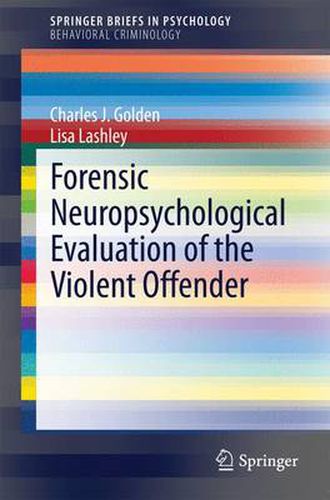Readings Newsletter
Become a Readings Member to make your shopping experience even easier.
Sign in or sign up for free!
You’re not far away from qualifying for FREE standard shipping within Australia
You’ve qualified for FREE standard shipping within Australia
The cart is loading…






This title is printed to order. This book may have been self-published. If so, we cannot guarantee the quality of the content. In the main most books will have gone through the editing process however some may not. We therefore suggest that you be aware of this before ordering this book. If in doubt check either the author or publisher’s details as we are unable to accept any returns unless they are faulty. Please contact us if you have any questions.
This book focuses on the importance of using a brain-behavior relationship framework for the successful use of neuropsychological evaluations for courtroom purposes. It stresses the need to understand the offender as a unique individual assessed accordingly from cognitive and personality perspectives. The desired goal is to reach a more nuanced evaluation rather than a compilation of test scores. This book clearly explains the circumstances that prevent proper testing including batteries that are confusing or frustrating to the person being tested or those that cause fatigue thus interfering with an appropriate picture of cognitive, motor and sensory skills. Irrelevance of some tests for addressing the reason for referral is also covered as is the importance of setting and adequate time for evaluation. When dealing with court cases involving the violent offender the evaluation is critical to the establishment of the factors that motivated the crime. In most cases the issue is not insanity but rather an understanding for legal purposes of the cognitive and emotional processes that explain how a crime occurred. This book provides a concise overview of the issues involved and how to provide the best scientific information to satisfy the pursuit of justice.
$9.00 standard shipping within Australia
FREE standard shipping within Australia for orders over $100.00
Express & International shipping calculated at checkout
Stock availability can be subject to change without notice. We recommend calling the shop or contacting our online team to check availability of low stock items. Please see our Shopping Online page for more details.
This title is printed to order. This book may have been self-published. If so, we cannot guarantee the quality of the content. In the main most books will have gone through the editing process however some may not. We therefore suggest that you be aware of this before ordering this book. If in doubt check either the author or publisher’s details as we are unable to accept any returns unless they are faulty. Please contact us if you have any questions.
This book focuses on the importance of using a brain-behavior relationship framework for the successful use of neuropsychological evaluations for courtroom purposes. It stresses the need to understand the offender as a unique individual assessed accordingly from cognitive and personality perspectives. The desired goal is to reach a more nuanced evaluation rather than a compilation of test scores. This book clearly explains the circumstances that prevent proper testing including batteries that are confusing or frustrating to the person being tested or those that cause fatigue thus interfering with an appropriate picture of cognitive, motor and sensory skills. Irrelevance of some tests for addressing the reason for referral is also covered as is the importance of setting and adequate time for evaluation. When dealing with court cases involving the violent offender the evaluation is critical to the establishment of the factors that motivated the crime. In most cases the issue is not insanity but rather an understanding for legal purposes of the cognitive and emotional processes that explain how a crime occurred. This book provides a concise overview of the issues involved and how to provide the best scientific information to satisfy the pursuit of justice.